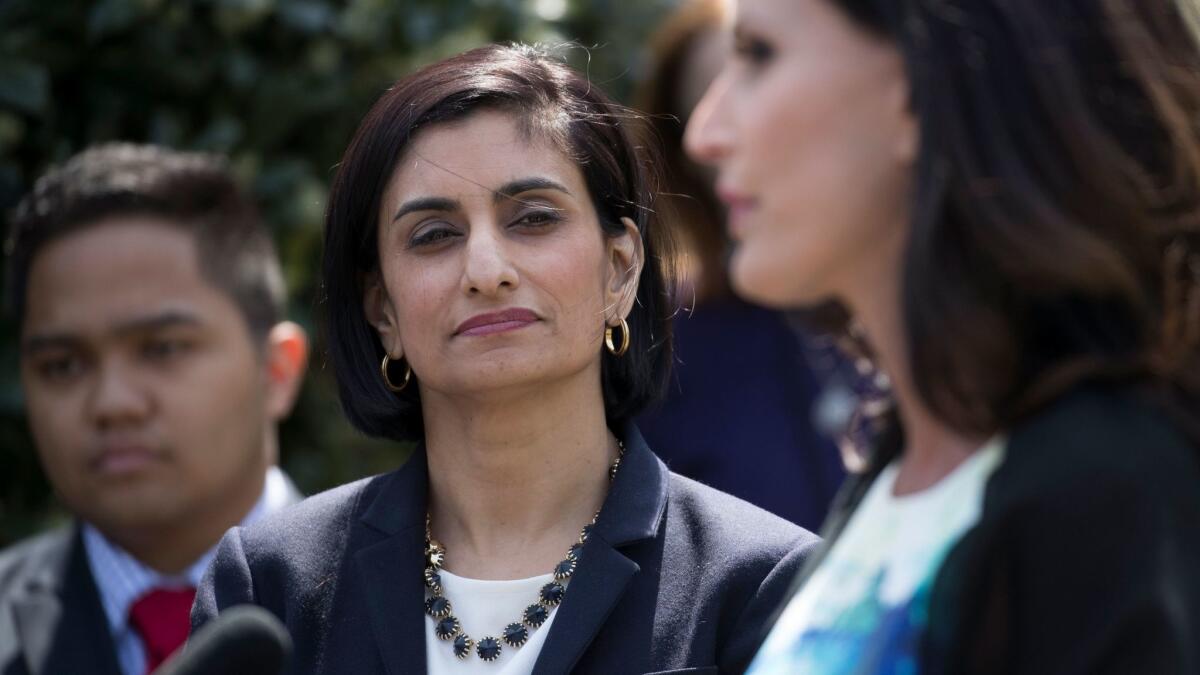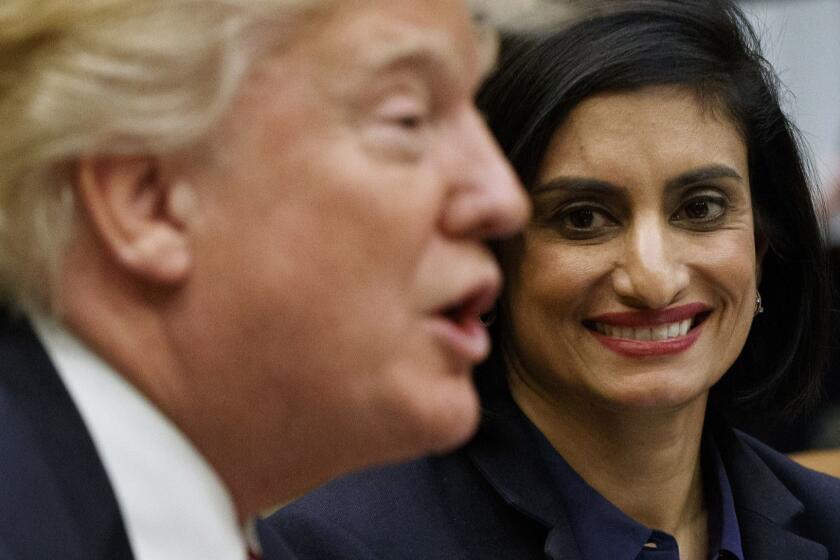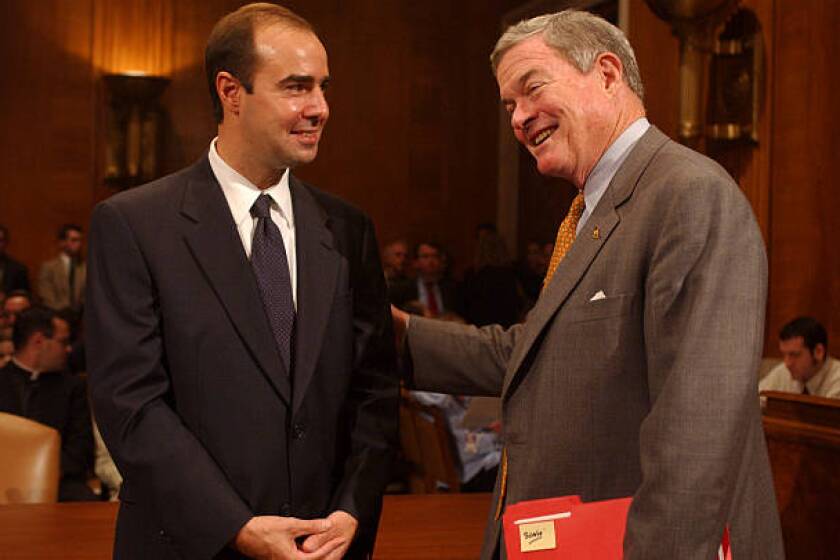Column: A Biden victory would put an end to Trump appointees vandalizing their own agencies

- Share via
Donald Trump hasn’t conducted his campaign to vandalize and stupefy the federal government single-handedly.
At every step he has been assisted by appointees put in place to undermine their agencies and dismantle policies and programs that in some cases have operated for decades.
Whether Trump will be turned out of office by Tuesday’s vote isn’t clear as we write. But the ending of his approach is at least visible, whether it occurs on Inauguration Day, less than three months from now, or lasts 51 months more.
[President Trump] has been so attentive to the scientific literature and the details and the data.
— White House coronavirus task force member Deborah Birx, polishing an apple for her boss, in March
If Democrat Joe Biden wins the election, he’ll have the power to reverse Trump’s practices, though putting devastated federal agencies back together may not be too easy. Yet it’s worthwhile to identify the vandals and examine their methodology for a better sense of the ordeal we’ve been going through since Jan. 20, 2017.
Trump’s assault on governmental norms has been focused on three general areas: healthcare, the environment and labor.
We’ve written before about the threat to public health personified by Seema Verma. As director of the Centers for Medicare and Medicaid Services, Verma is responsible for making those programs, as well as the Affordable Care Act, work better for their enrollees.
Instead she has taken every step imaginable to hobble the government’s premier public health programs.
Seema Verma, the federal official in charge of Medicare, Medicaid and the Affordable Care Act, has blasted into the limelight. And not in a good way.
Verma has assiduously promoted work requirements for Medicaid recipients, despite reams of evidence that those requirements force enrollees off Medicaid and do nothing to improve their health or help them find jobs — and despite the consistent rejection of these rules by federal judges.
Verma has continually denigrated the ACA as ineffective at bringing health coverage to working-class and low-income Americans, despite statistics from her own shop demonstrating that 20 million Americans have gained coverage through the ACA.
Just this week, Verma approved a waiver allowing Georgia to withdraw from healthcare.gov, the federal exchange for ACA insurance plans, without establishing its own state exchange.
The waiver narrows the options for Georgians seeking ACA health plans starting in 2023 by forcing them to turn to private brokers and agents, commercial websites or insurance companies, none of which have an incentive to steer consumers to the plans best for them.
As Verma herself observed in her approval letter, Georgia insurance brokers and agents will earn commissions higher by 22% if they steer consumers toward short-term health plans that lack the consumer protections — including protections for those with preexisting health conditions — of the ACA.
When President Trump nominated David Bernhardt for a top-level post at the Interior Department, environmentalists and water experts could see trouble ahead.
Trump appointees’ assault on environmental protection has taken many forms. He installed Interior Secretary David Bernhardt, a corporate lobbyist who made a career of attacking the Endangered Species Act for his clients, an effort he has continued as a Cabinet member.
Bernhardt has also been accused of involving himself in efforts to loosen environmental restrictions on water flows for California farmers, including those served by the giant Westlands Water District, a client of Bernhardt’s during his years as a corporate lawyer.
On another front, Environmental Protection Agency Administrator Andrew Wheeler and Transportation Secretary Elaine Chao (the wife of Republican Senate Majority Leader Mitch McConnell of Kentucky) are leading efforts to roll back auto emissions standards nationwide and revoke California’s authority to set its own rules — steps that would reverse policies drafted by their agencies, in some cases decades ago.
Trump’s appointees have turned the Department of Labor — the only Cabinet agency devoted exclusively to the concerns of working Americans — into a Department of Employer Rights.
Trump’s first Labor secretary, Alex Acosta (who lost his post after he was identified as the federal prosecutor who offered Jeffrey Epstein a sweetheart plea deal on federal sex abuse charges in 2008), Acosta’s successor, Eugene Scalia, and Trump appointees on the National Labor Relations Board have reversed or stymied initiatives aimed at expanding workplace rights for gig workers and minimum wage employees.
Trump’s evisceration of labor protections will continue under Labor Department nominee Scalia
Acosta opposed raising the federal minimum wage from $7.25 an hour, where it has been stuck for 11 years. Since Scalia, son of the late Supreme Court Justice Antonin Scalia, only took office in July 2019, he hasn’t had much time to make his mark on the department. But his legal work before then involved fighting workplace regulations for corporate clients such as Walmart.
Scalia’s targets included regulations promulgated by the Occupational Safety and Health Administration, an agency of his current department.
Since the pandemic, he hasn’t shown himself to be a vocal supporter of protections against infectious diseases in the workplace.
Under Acosta and Scalia, the number of OSHA inspectors has fallen to its lowest level since 1975 — only 862 inspectors to cover millions of worksites. As the National Employment Law Project observed in April, at that staffing level it would take OSHA 165 years to inspect every workplace under its jurisdiction just once.
Not every Trump appointee has come to work intent on wrecking his or her own department. Some may have remained in place despite the hostility of the Trump White House toward good government, either out of desperation to hold on to a government sinecure or a misguided notion that they could still do some good by working from the inside.
In too many cases, these poor souls ended up destroying their own reputations without doing any good at all. The most telling examples come from the healthcare sphere, specifically the battle against COVID-19.
Perhaps the saddest story is that of Deborah Birx, who was known for having dedicated her medical career to fighting HIV when she was appointed in mid-March, to great praise, to Trump’s coronavirus task force.
Trump’s authority to revoke California’s waiver from federal clean air rules rests on a very shaky legal foundation.
Within days, Birx was describing Trump in terms that made him sound like the second coming of Isaac Newton: “He’s been so attentive to the scientific literature and the details and the data,” Birx told the Christian Broadcasting Network on March 27, well after Trump had started touting chloroquine, which is useless against COVID-19, and predicting that the pandemic would vanish like “a miracle” — assertions that both swore at scientific understanding.
On Nov. 2, the day before election day, Birx finally issued an internal report for White House aides warning, “We are entering the most concerning and most deadly phase of this pandemic … leading to increasing mortality.” By then, her words looked wretchedly belated, for about 800 Americans have been dying from COVID-19 every day.
Birx didn’t have a government agency to undermine. That wasn’t the case with Stephen Hahn or Robert Redfield, physicians directing, respectively, the Food and Drug Administration and the Centers for Disease Control and Prevention. These agencies’ once gold-plated professional standings plummeted precipitously because of their leaders’ willingness to toady to Trump and his anti-science policies.
Those are federal appointees who arguably were trying to do good but were simply overmatched by the mendacity and amorality of the White House they served. They’re outranked by the appointees to high government posts, including Cabinet positions, who deliberately served up policies that stood against the public interest and showed themselves eager to dismantle their own agencies to do so.
More to Read
Inside the business of entertainment
The Wide Shot brings you news, analysis and insights on everything from streaming wars to production — and what it all means for the future.
You may occasionally receive promotional content from the Los Angeles Times.














